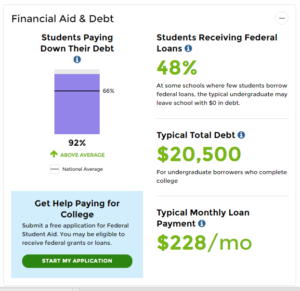 “Where are you going to college next year?” Before you can answer that question, you really need to know which college is right for you. Here are 3 questions to ask yourself as you begin deciding where you want to go to college. Let’s face it: This is a big decision fraught with all sorts of emotion and angst. Where you go may decide not only how much it will cost you now as well as over time with student loans but where you live and work after college, and who you have for friends or a life partner.
“Where are you going to college next year?” Before you can answer that question, you really need to know which college is right for you. Here are 3 questions to ask yourself as you begin deciding where you want to go to college. Let’s face it: This is a big decision fraught with all sorts of emotion and angst. Where you go may decide not only how much it will cost you now as well as over time with student loans but where you live and work after college, and who you have for friends or a life partner.
Below you may be able to at least understand what these 3 questions are that you’ll need to answer when deciding which college is right for you.
Guest Post for Association of College Funding Specialists by Jonathan Goodsell is a Management and Program Analyst at the U.S. Department of Education’s office of Federal Student Aid. Photo by Andrew Jones, U.S. Department of Education.
Sometimes it feels like this is the only question people ask you. Maybe you’ve been dreaming about a certain university, or maybe you have no idea what you even want to do with your life, let alone where to go to college. Choosing the right school and program is one of the biggest decisions of your life (no pressure). However, before you take the plunge, here are three questions to help you figure out “What’s best for me?”
1. Do I know what I want to do with my life?
If you can answer a resounding “Yes!” to this question, I would suggest you stay open to new possibilities. For example, I really thought I wanted to be a psychologist, so I found a great school with a great psychology program. However, after my first semester, I realized I liked psychology, but I loved writing and teaching. I switched my major to English Writing & Rhetoric; became a published author; taught at inner-city schools, and now I work for the U.S. Department of Education. My point is you never really know where life will take you. So if you’ve always wanted to be a doctor, great: get into the best program you can—just don’t close yourself off to trying new things.
If you’re not really sure or have no clue, that’s fine; you have options. Start at a university with an undecided major. Looking to save some dough? Knock out a few basic courses at your local community college (this may give you a better indication of what you like and don’t like—just make sure your credits will transfer). Or, you can take some time off and travel or work; some good old-fashioned real-world experience can be a great eye-opener—check out this sweet career search tool for info and inspiration!
2. Have I explored all my options?
Maybe you’ve always wanted to go to Harvard; everyone in your family went to Harvard—Harvard is for you! Or is it? Sometimes the school that looks best on paper (or in your head) isn’t the best all-around fit for you. Check out competing programs; look for info like tuition, graduation rate, earning potential, typical total debt, etc.
Also, college is fun. Like FUN!!!! Yes, you’re there to work hard and get an education so you can become a contributing member of society and fulfill your dreams; but college is also a lot of fun. So, think about what type of school might be the best fit for you. Are you all about a big city or a more rural location? Do you dream of a huge campus with tons of people or do you like the idea of a closer-knit community? What about study abroad or certain social groups, organizations, clubs, and sports? These should also be factors you should include in your big decision.
By this point, you might be wondering how you’re going to find all this info out and use it to compare various programs. My friends, I give you College Scorecard. This site is designed to help you find schools based on degree, location, and other search criteria. Plus, you can compare schools based on school size, average annual cost, graduation rate, average salary after graduation, etc.
3. How can I afford this?
Start hunting for scholarships and grants. Like YouTube tutorials and social media groups, there are scholarships and grants for almost anything you can think of. Next, fill out your Free Application for Federal Student Aid (FAFSA®). It’s free, just like the name says, so if you haven’t filled out your FAFSA yet do it now—I mean, finish this blog first—then complete your FAFSA.
Think about what you really want, do your research, look at all your options, and choose the best program for you—after all, it’s your decision.
And if you need help as you go through the process, reach out to a qualified college funding specialist.



